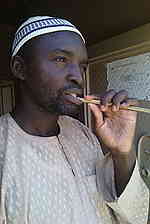TOOTH PRESERVATION BEFORE MODERN TOOTH PAST AND BRUSH.
It will surprised your thoughts about the the provision of ecosystem of Africa African preservation of their tooth.
Looking at the ecosystems of Africa, Africans used what the system provides and solved what they really need to live a fulled life. This varies from one regions to another.
Take an imaginative thoughts of what exist before the introduction of modern toothbrush and toothpaste and still our father's work with out mouth bad smells. They are various names for this mouth wash popularly known as chwenstick.
HISTORICAL MAPS.
The earliest chew sticks have been dated to Babylonia in 3500 BC and an Egyptian tomb from 3000 BC; they are mentioned in Chinese records dating from 1600 BC and in the tipitaka , the buddhist canon. Purported to be giving account of events which took place in the north-western India around the 5th century BC.
MEDICAL BENEFITS OF CHEWNSTICKS.
It will surprised your thoughts about the the provision of ecosystem of Africa African preservation of their tooth.
Looking at the ecosystems of Africa, Africans used what the system provides and solved what they really need to live a fulled life. This varies from one regions to another.
Across the continent, many Africans goes about their daily business with a small stick or twig protruding from their mouth, which they chew or use to scrub their teeth.
Cut from wild trees and shrubs in the bush, this is the African toothbrush. Its users swear it is much more natural, effective -- and cheaper -- than the prettily packaged but pricey dental products on sale in pharmacies and supermarkets.
"It cleans your teeth more than plastic brushes, with the liquid that comes out of the wood ...," Marcelino Diatta.
Its consists components from the plants design to use for the cleaning tooth and the mouth in general along helps to cure various mouth disease.HISTORICAL MAPS.
The earliest chew sticks have been dated to Babylonia in 3500 BC and an Egyptian tomb from 3000 BC; they are mentioned in Chinese records dating from 1600 BC and in the tipitaka , the buddhist canon. Purported to be giving account of events which took place in the north-western India around the 5th century BC.
MEDICAL BENEFITS OF CHEWNSTICKS.
In Africa, chew sticks are made from various trees a good example is salvadora persica tree that have been tested on the various medecal benefits.
Salvadora persica, also known as the "toothbrush tree", Salvadorapersica has antiurolithiatic properties that is used for centuries as a natural toothbrush. , also its fibrous branches have been promoted by medical professionals. The world Health Organization for oral hygiene use. The medical benefits properties of this selected chewn stick tree. Abrasives, Antiseptics, Astringent detergent and enzyme inhibitors of all bad mouth smell.
Salvadora persica is a small tree or shub with a crooked trunk, seldom more than one foot in diameter. Its bark scabrous and cracked, whitish with pendulous extremities.
The root bark of the tree is similar to sand, and the inner surfaces are an even lighter shade of brown. It has a pleasant fragrance, of cress or mustard, as well as a warm and pungent taste. The leaves break with a fine crisp crackle when trodden on. The tree grows to a maximum height of three meters. As it's designed to grow in this contents with medical potential.
TRADITIONAL& RELIGIOUS MIGHT .
Traditionally the use of chwen stick is clearly seen as must
Traditionals showcase this in their cultural activities, along the
Satisfaction of traditional rights towards their cultures.
The africa health pratictional has encouraged the use of chewing sticks as an alternative source of oral hygiene in poor countries where many cannot afford commercial dental products also this is supported by world health organisation.
In mostly nations inthe continents people say there are traditional and religious precedent for the use of the chewing sticks.
In holy Islamic writings known as the Hadith, the Prophet Mohammed recommends their use as part of cleaning rituals that are an essential element of daily prayers.
For prayers, you have to get really clean, and that includes the teeth" Diop.--


Comments
Post a Comment
Your views are highly welcome.